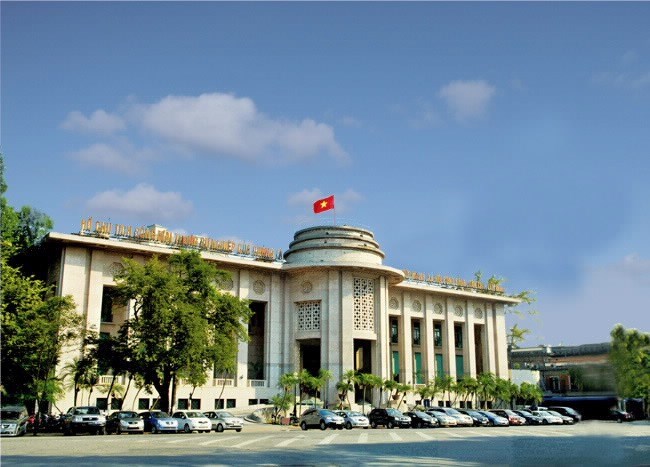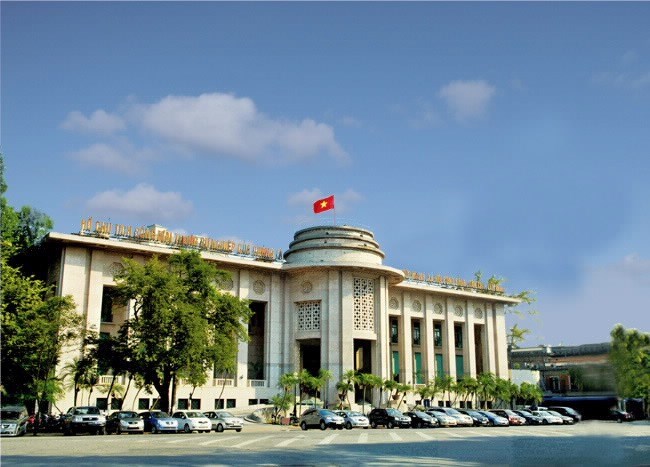
The State Bank of Vietnam (SBV) is collecting feedback on a draft circular that will, among other things, allow non-residents legally present in Vietnam to make term deposits in both VND and foreign currencies.

Headquarters of the State Bank of
Vietnam in Hanoi (Photo: SBV)
The central bank argues that the
permission is a measure to prevent "hot money flows,” or flow of funds from one
country to another to earn short-term profit on interest
rates differences, from entering the exchange market. It is also a way to
ensure the legal rights of non-residents present in the country, it said.
The draft, released on July 4, has thus far received positive feedback from
commercial banks and other credit institutions. Directors at a majority of the
banks consider the circular a significant improvement over previous
regulations, the SBV has reported. They said the new rules can help attract
another source of capital and utilise idle capital from expatriates working in
Vietnam.
Furthermore, by allowing foreigners to switch from using a current account in
VND or foreign currency to using term deposits, authorities will also find
it much easier to control the flow of capital from this group.
It is hoped that with interest rates on deposits in foreign currencies at
zero percent, the five to eight percent interest rates for deposits in VND will
motivate more people to deposit their savings in the local currency.
The central bank said that previously, non-resident foreigners in Vietnam were
only allowed to open current accounts in VND or foreign currencies, so the new
circular will also help advance the government’s aim to move towards a national
cashless payment system, and better control foreign currency flows.
The draft circular defines non residents as individuals present in Vietnam
for 12 months or less, who are currently working, undergoing medical treatment,
travelling for recreational purposes, or any employees of foreign embassies,
organisations and companies in Vietnam regardless of time limit.
At present, the SBV is trying to alleviate pressure on interest rates by
increasing liquidity in the money market.
This has happened because the central bank has purchased more foreign
currencies to increase its reserves, according to a second quarter report by
the Vietnam Institute for Economic and Policy Research (VEPR).
Source:VNA
According to data from the Hoa Binh Provincial Party Committee, the industrial production index for the first six months of 2025 is estimated to have increased by 20% compared to the same period last year. This marks the highest year-on-year growth rate for this period since 2020.
In the first six months of 2025, Hoa Binh province’s export turnover was estimated at 1.145 billion USD, marking an 18.11% increase compared to the same period in 2024. Import turnover was estimated at $ 804 million, a 17.15% increase, which helped the province maintain a positive trade balance.
The lives of the ethnic minority farmers in Tan Lac district have gradually improved thanks to the new directions in agricultural production. This is a testament to the collective strength fostered through the professional associations and groups implemented by various levels of the district’s Farmers’ Union.
With the motto the "product quality comes first,” after nearly one year of establishment and operation, Muong village’s Clean Food Agricultural and Commercial Cooperative, located in Cau Hamlet, Hung Son Commune (Kim Boi district), has launched reputable, high-quality agricultural products to the market that are well-received by consumers. The products such as Muong village’s pork sausage, salt-cured chicken, and salt-cured pork hocks have gradually carved out a place in the market and they are on the path to obtaining the OCOP certification.
In the past, the phrase "bumper harvest, rock-bottom prices" was a familiar refrain for Vietnamese farmers engaged in fragmented, small-scale agriculture. But today, a new spirit is emerging across rural areas of Hoa Binh province - one of collaboration, organisation, and collective economic models that provide a stable foundation for production.
Maintaining growing area codes and packing facility codes in accordance with regulations is a mandatory requirement for agricultural products to be eligible for export. Recently, the Department of Agriculture and Environment of Hoa Binh province has intensified technical supervision of designated farming areas and packing facilities to safeguard the "green passport" that enables its products to access international markets.



